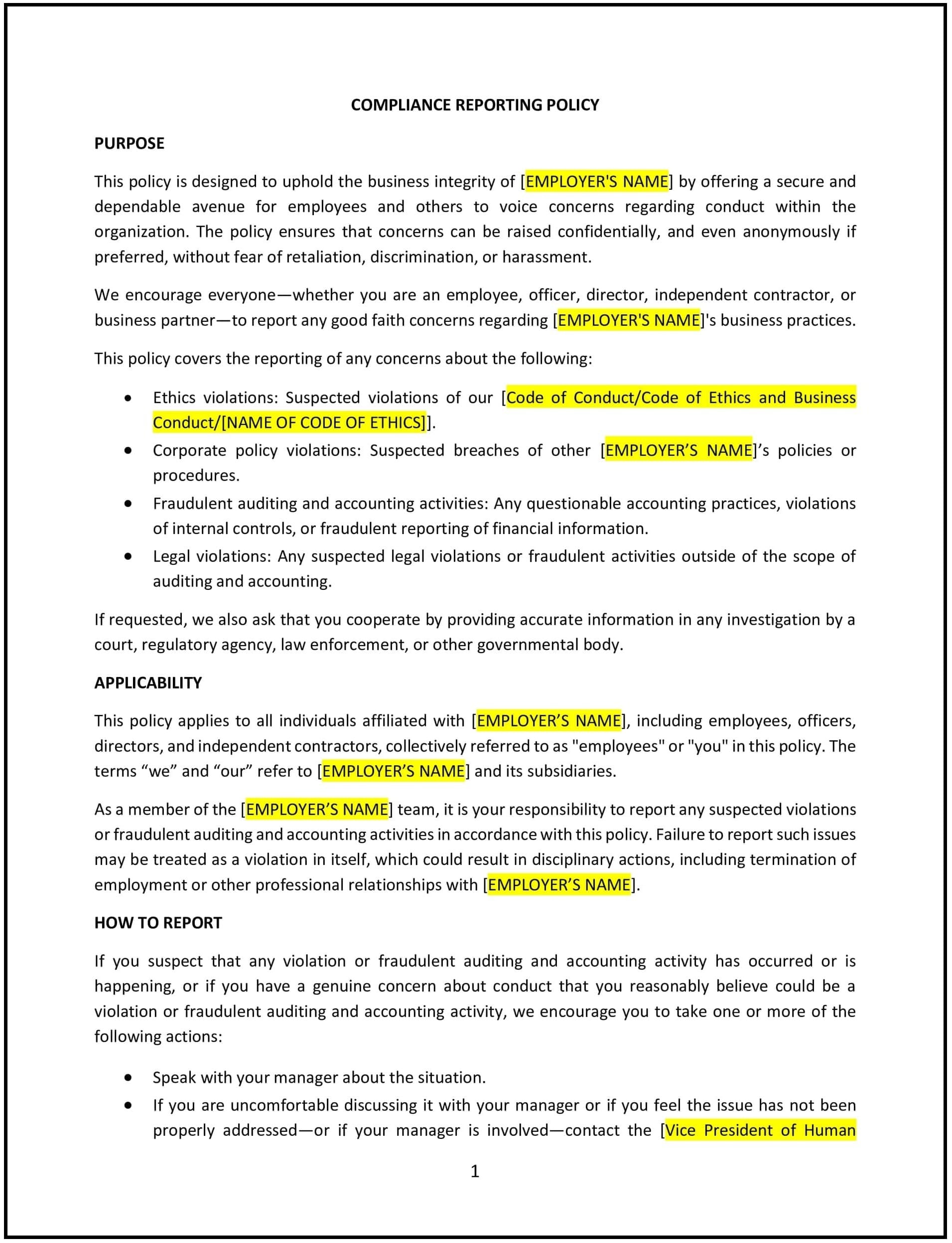Compliance reporting policy (Florida): Free template
Got contracts to review? While you're here for policies, let Cobrief make contract review effortless—start your free review now.

Customize this template for free
Compliance reporting policy (Florida)
A compliance reporting policy helps Florida businesses ensure that employees are aware of the procedures for reporting violations of laws, regulations, or company policies. This policy outlines the process for employees to report concerns about compliance issues, including potential legal violations, unethical behavior, or breaches of company policy, while providing protection against retaliation for reporting.
By implementing this policy, businesses can foster a culture of transparency, ensure legal and regulatory compliance, and mitigate risks associated with non-compliance or misconduct.
How to use this compliance reporting policy (Florida)
- Define the types of violations: Clearly outline the types of violations that should be reported, such as legal violations, regulatory non-compliance, unethical behavior, conflicts of interest, discrimination, harassment, fraud, or safety issues.
- Set reporting channels: Establish clear and accessible reporting channels for employees to use when submitting concerns, such as a dedicated hotline, email, or a compliance officer. The reporting method should ensure confidentiality and allow employees to report concerns anonymously if desired.
- Provide protection against retaliation: Emphasize the company’s commitment to protecting employees from retaliation when they report compliance concerns in good faith. Specify that retaliation or adverse action against employees who report violations will not be tolerated.
- Outline the reporting process: Define the steps involved in reporting a compliance concern, including how employees should submit their reports, the information required (e.g., details of the violation, evidence), and the expected timeline for response.
- Establish confidentiality: Ensure that reports are handled with confidentiality, and that employees’ identities are protected to the extent possible. This will encourage employees to come forward without fear of exposure.
- Define the investigation process: Explain how reported concerns will be investigated, including the roles of relevant staff (e.g., compliance officers, HR, legal teams), the scope of investigations, and how findings will be documented.
- Set consequences for non-compliance: Specify the consequences for individuals found to be in violation of company policies or applicable laws, and outline the steps the company will take to address non-compliance, including potential disciplinary actions.
Benefits of using this compliance reporting policy (Florida)
This policy offers several benefits for Florida businesses:
- Promotes a culture of transparency: By encouraging employees to report concerns, businesses can foster an open and ethical environment where compliance is prioritized.
- Reduces legal and financial risks: Reporting mechanisms help businesses identify potential violations early, minimizing the risk of fines, lawsuits, or damage to the company’s reputation.
- Protects the company’s reputation: By ensuring that compliance issues are addressed proactively, the business can protect its reputation and maintain trust with employees, customers, and regulators.
- Encourages accountability: Employees are held accountable for their actions, and businesses ensure that violations of company policies or legal requirements are addressed promptly and fairly.
- Increases employee trust and engagement: Employees are more likely to stay engaged and committed to the organization when they feel confident that their concerns will be taken seriously and acted upon without fear of retaliation.
Tips for using this compliance reporting policy (Florida)
- Communicate the policy clearly: Ensure that all employees are aware of the policy, understand the reporting process, and know where to go if they have concerns about compliance issues.
- Provide training: Regularly train employees and managers on the importance of compliance, how to report issues, and how to foster an environment that encourages ethical behavior and transparency.
- Ensure easy access to reporting channels: Make sure that the reporting channels are easily accessible and that employees feel comfortable using them without fear of exposure or retaliation.
- Follow up on reports: Ensure that all compliance reports are taken seriously, investigated promptly, and resolved effectively. Communicate the results of investigations to the reporting employee, if appropriate.
- Review regularly: Periodically review the policy to ensure it remains aligned with changes in Florida laws, industry best practices, and company operations, and make adjustments as necessary.